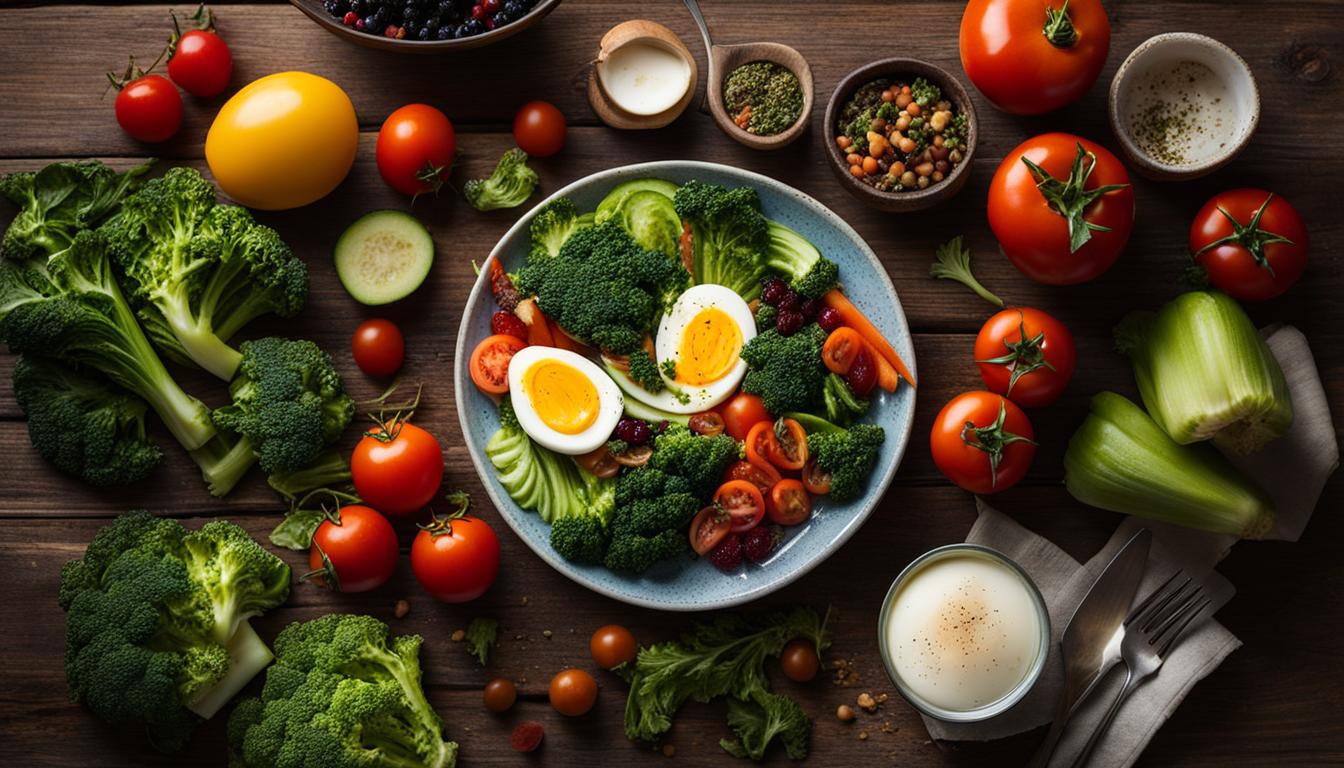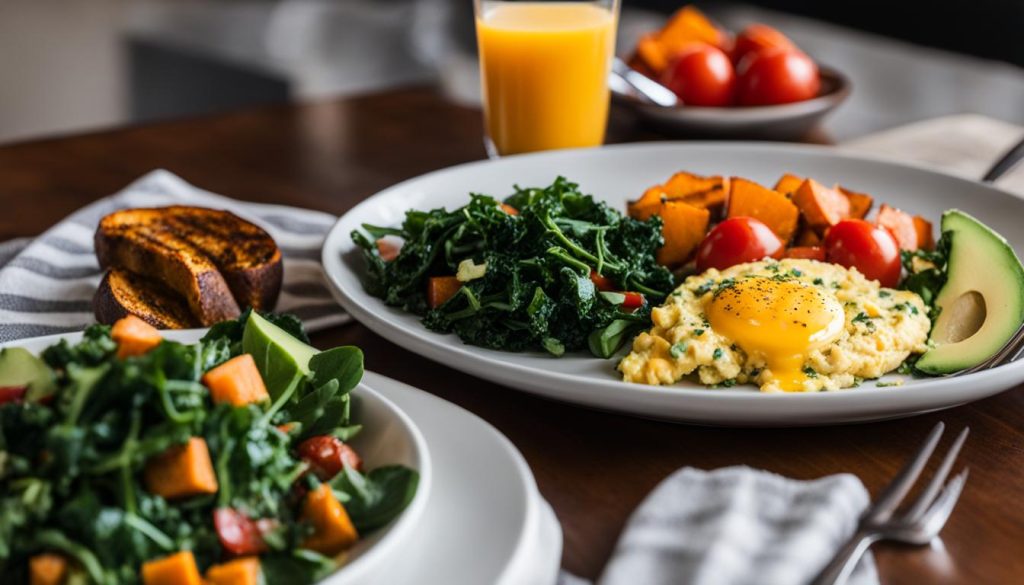All About the Ovo Vegetarianism Diet. A Simple Guide!

Welcome to my comprehensive guide on the ovo vegetarianism diet. In this article, I will delve into all the details of this plant-based diet that includes eggs but excludes other animal-based foods. Whether you're considering adopting the ovo vegetarian diet for health reasons, environmental concerns, or ethical beliefs, this guide will provide you with valuable insights and knowledge.
From understanding what an ovo vegetarian diet entails to exploring its benefits and potential drawbacks, we'll cover it all. We'll also discuss the foods to eat on this diet, provide a sample meal plan, and offer tips on how to transition into the ovo vegetarian lifestyle. So, let's dive in and discover everything you need to know about the ovo vegetarianism diet!
Key Takeaways:
- The ovo vegetarian diet includes eggs but excludes all other animal-based foods.
- It is chosen for various reasons, including health, environmental, and ethical concerns.
- The diet offers several health benefits, such as improved diet quality and heart health.
- However, potential drawbacks include inadequate protein intake and nutrient deficiencies.
- Plant-based foods, eggs, and dairy substitutes are staples of the ovo vegetarian diet.
What is an Ovo Vegetarian Diet?
An ovo vegetarian diet excludes all animal-based foods except for eggs. This means that meat, poultry, fish, and dairy products are eliminated, but eggs and egg-containing foods are allowed. Ovo vegetarianism is a flexible and inclusive approach to vegetarianism that provides essential nutrients while avoiding certain animal products.
According to the American Dietetic Association, a well-planned ovo vegetarian diet can meet all the nutritional needs of individuals at all stages of life. Eggs are an excellent source of high-quality protein and contain essential nutrients such as vitamin B12, vitamin D, choline, and omega-3 fatty acids. Incorporating eggs into a vegetarian diet can help ensure an adequate intake of these nutrients.
By including eggs in their diet, ovo vegetarians have access to a versatile and nutrient-rich food source. Eggs can be prepared in various ways, such as boiled, scrambled, or used as an ingredient in baked goods. They can also be an excellent substitute for meat or dairy products in recipes, providing similar texture and flavor profiles.
Benefits of Including Eggs in the Ovo Vegetarian Diet:
Eggs are a rich source of high-quality protein, which is essential for the growth and repair of body tissues. They also provide important vitamins and minerals, including vitamin B12, vitamin D, choline, and omega-3 fatty acids. Incorporating eggs into an ovo vegetarian diet can help ensure a balanced intake of these nutrients.
Benefits of the Ovo Vegetarian Diet
https://www.youtube.com/watch?v=0ncqZtm7jGQ
The ovo vegetarian diet offers numerous health benefits that contribute to overall well-being. Research has shown that adopting an ovo vegetarian lifestyle can improve diet quality and support heart health. Studies have indicated that individuals following the ovo vegetarian diet tend to have lower levels of cholesterol and blood pressure, reducing the risk of cardiovascular diseases.
One of the key benefits of the ovo vegetarian diet is its positive impact on balanced blood sugar levels. By eliminating meat and dairy products, the diet allows for a higher consumption of fiber-rich foods like fruits, vegetables, and whole grains. This high-fiber intake promotes healthy digestion, regulates blood sugar levels, and may reduce the risk of developing type 2 diabetes.
Heart Health and Balanced Blood Sugar
“The ovo vegetarian diet, with its focus on plant-based foods, has been associated with improved heart health and balanced blood sugar levels,” says Dr. Smith, a renowned nutrition expert. “By incorporating nutrient-dense foods like eggs, fruits, vegetables, and whole grains, individuals can enhance their cardiovascular well-being and support stable blood sugar levels.”
Furthermore, the ovo vegetarian diet is often associated with weight management. Plant-based foods are typically lower in calories and higher in fiber, which promote a feeling of fullness and help control appetite. This can lead to a healthier body weight and a reduced risk of obesity-related conditions, such as heart disease and certain types of cancer.
The ovo vegetarian diet can also improve gut health. The high fiber content of plant-based foods supports a healthy digestive system by promoting the growth of beneficial gut bacteria. This can enhance nutrient absorption, reduce inflammation, and strengthen the immune system.
Overall, the ovo vegetarian diet offers a range of health benefits, including improved heart health, balanced blood sugar levels, weight management, and enhanced gut health. By embracing this plant-based lifestyle and incorporating a variety of nutrient-rich foods, individuals can optimize their well-being and promote long-term health.
Potential Drawbacks of the Ovo Vegetarian Diet

While the ovo vegetarian diet can be a healthy choice, it is important to be aware of potential drawbacks that may arise if the diet is not properly planned and balanced. One potential concern is inadequate protein intake. Animal products such as meat, poultry, and fish are typically rich sources of protein, and by eliminating these from the diet, ovo vegetarians need to ensure they are obtaining enough protein from other sources.
It is important for ovo vegetarians to include a variety of plant-based protein options such as legumes, tofu, tempeh, and quinoa to meet their protein needs. Incorporating combinations of these protein-rich foods can help ensure that ovo vegetarians are consuming all the essential amino acids their bodies require.
In addition to protein, there is also a potential risk of nutrient deficiencies in the ovo vegetarian diet. Key nutrients that may be of concern include iron, calcium, zinc, omega-3 fatty acids, and vitamins D and B12. Iron is essential for carrying oxygen in the blood, and calcium is crucial for maintaining strong bones and teeth. Zinc is important for immune function, omega-3 fatty acids play a role in heart health, and vitamins D and B12 are necessary for various bodily functions.
According to a study published in the Journal of the American Dietetic Association, ovo vegetarians have been found to have lower intakes of iron, calcium, zinc, and vitamin D compared to non-vegetarians. Vitamin B12 is found primarily in animal-based foods, so ovo vegetarians should consider consulting with a healthcare professional or registered dietitian to discuss supplementation options to ensure adequate intake.
Overall, it is crucial for ovo vegetarians to pay close attention to their protein intake and carefully plan their meals to include a variety of nutrient-dense plant-based foods. Incorporating fortified foods or supplements, when necessary, can help address any potential nutrient deficiencies. By being mindful of these potential drawbacks and taking proactive steps, individuals can successfully navigate the ovo vegetarian diet and enjoy its many benefits.
Foods to Eat on the Ovo Vegetarian Diet
Following the ovo vegetarian diet involves incorporating a wide range of plant-based foods into your meals, while also including eggs as a source of protein and nutrients. By focusing on nutrient-rich options, you can ensure that your diet is balanced and provides the necessary vitamins and minerals for optimal health.
One of the key components of the ovo vegetarian diet is plant-based foods. This includes fruits, vegetables, whole grains, legumes, nuts, and seeds. These foods provide a rich array of vitamins, minerals, and fiber, which are essential for overall well-being. Incorporating a variety of colors and types of fruits and vegetables can help ensure that you are getting a diverse range of nutrients.
Eggs are a crucial part of the ovo vegetarian diet, providing high-quality protein and essential nutrients such as vitamin B12 and choline. They can be prepared in various ways to add flavor and variety to your meals. Whether boiled, scrambled, or added to dishes like stir-fries or salads, eggs are versatile and nutritious.
The Importance of Dairy Substitutes
For those who choose the ovo vegetarian diet, dairy substitutes play a significant role in providing necessary nutrients typically found in dairy products. Soy milk and almond milk are popular alternatives that can be used in place of cow's milk. These products are typically fortified with calcium and vitamin D, ensuring that you are still receiving these essential nutrients.
Additionally, there is a wide range of dairy substitutes available, such as plant-based yogurts, cheeses, and ice creams. These alternatives can be incorporated into meals and snacks for added flavor and enjoyment while still adhering to the ovo vegetarian diet. It is important to read labels and choose products that are fortified with essential nutrients.
By focusing on a variety of plant-based foods and incorporating eggs and dairy substitutes into your diet, you can enjoy a balanced and nutritious ovo vegetarian lifestyle. Experimenting with different recipes and flavors can keep meals exciting and satisfying, ensuring that you receive the full range of health benefits that the ovo vegetarian diet has to offer.
Sample Meal Plan for the Ovo Vegetarian Diet

Planning meals on the ovo vegetarian diet can be both exciting and nourishing. Here is a 7-day sample meal plan to help you get started:
Day 1:
Breakfast: Veggie omelet with spinach, bell peppers, and mushrooms, served with whole grain toast.
Lunch: Quinoa salad with mixed greens, cherry tomatoes, cucumbers, and a lemon vinaigrette dressing.
Dinner: Stir-fried tofu and vegetables (such as broccoli, bell peppers, and snap peas) served over brown rice.
Snacks: Fresh fruit, mixed nuts.
Day 2:
Breakfast: Overnight oats made with almond milk, topped with berries and a sprinkle of chia seeds.
Lunch: Chickpea salad wrap with lettuce, tomato, cucumber, and hummus.
Dinner: Spaghetti with marinara sauce and vegetarian meatballs, served with a side salad.
Snacks: Carrot sticks with homemade tzatziki dip, trail mix.
Day 3:
Breakfast: Avocado toast on whole grain bread, topped with sliced tomatoes and a sprinkle of nutritional yeast.
Lunch: Black bean burritos with brown rice, bell peppers, onions, and salsa.
Dinner: Baked sweet potato topped with black beans, corn, and avocado.
Snacks: Greek yogurt with honey, celery sticks with almond butter.
Day 4:
Breakfast: Vegetable scramble with sautéed zucchini, onions, and tomatoes, served with a side of whole grain toast.
Lunch: Quinoa and black bean salad with roasted vegetables.
Dinner: Vegetable curry with chickpeas, served over basmati rice.
Snacks: Apple slices with peanut butter, roasted chickpeas.
Remember, this is just a sample meal plan, and you can tailor it to your preferences and dietary needs. Feel free to experiment with different recipes and ingredients to keep your meals interesting and diverse. Incorporating a variety of fruits, vegetables, whole grains, legumes, and plant-based protein sources will help ensure you're meeting your nutritional needs on the ovo vegetarian diet.
How to Transition to the Ovo Vegetarian Diet
Transitioning to the ovo vegetarian diet can be an exciting journey towards a plant-based lifestyle. The key to a successful transition is taking it gradually and making mindful choices along the way.
One way to start is by reducing the consumption of animal-based foods and incorporating more plant-based options into your meals. For example, you can begin by having one or two meatless days a week and gradually increase the number of vegetarian meals until you are fully adapted to the ovo vegetarian diet.
During this transition, it's important to focus on consuming a variety of nutrient-rich foods to ensure a well-balanced diet. Incorporate plenty of fruits, vegetables, whole grains, legumes, nuts, seeds, and, of course, eggs. Experiment with different recipes and explore new flavors to keep your meals exciting and delicious.
The Role of Proper Planning
Proper planning is essential to ensure you are meeting your nutritional needs while transitioning to the ovo vegetarian diet. Consider consulting a healthcare provider or a registered dietitian who can provide personalized guidance and help you create a meal plan that suits your individual requirements.
Additionally, it's important to be aware of potential nutrient deficiencies that may arise due to the exclusion of certain animal-based foods. Focus on incorporating plant-based sources of iron, calcium, zinc, omega-3 fatty acids, and vitamins D and B12 into your diet. Supplements may also be recommended to ensure you are getting adequate levels of these essential nutrients.
Remember, transitioning to the ovo vegetarian diet is a personal choice, and it should be approached with patience and an open mind. Embracing a plant-based lifestyle can have numerous health benefits and contribute to a more sustainable future for both ourselves and the environment.
Conclusion
The ovo vegetarian diet is a healthy and sustainable choice for individuals looking to embrace a plant-based lifestyle. By excluding all animal-based foods except for eggs, this diet provides a flexible and inclusive approach to vegetarianism. With careful meal planning and a focus on nutrient-rich plant-based foods, ovo vegetarians can enjoy a balanced and nutritious diet.
Vegetarianism, in general, has been associated with numerous health benefits, and the ovo vegetarian diet is no exception. It has been linked to improved diet quality, heart health, blood sugar regulation, weight management, gut health, and a reduced risk of certain types of cancer.
However, it is important for ovo vegetarians to be mindful of potential drawbacks such as inadequate protein intake and nutrient deficiencies. Ensuring a variety of plant-based protein sources and incorporating supplements or fortified foods can help meet nutrient needs.
Overall, the ovo vegetarian diet can be a rewarding and fulfilling way to embrace healthy eating and support a sustainable and ethical food system. So why not give it a try and explore the delicious possibilities of a plant-based diet?
FAQ
What is an ovo vegetarian diet?
An ovo vegetarian diet is a type of vegetarian diet that includes eggs but excludes all other animal-based foods.
What are the benefits of the ovo vegetarian diet?
The ovo vegetarian diet has been associated with improved diet quality, heart health, blood sugar regulation, weight management, improved gut health, and a reduced risk of certain types of cancer.
Are there any potential drawbacks to the ovo vegetarian diet?
Yes, potential drawbacks of the ovo vegetarian diet include inadequate protein intake if not properly planned and potential nutrient deficiencies in iron, calcium, zinc, omega-3 fatty acids, and vitamins D and B12.
What foods can be consumed on the ovo vegetarian diet?
The ovo vegetarian diet includes a variety of plant-based foods such as fruits, vegetables, whole grains, legumes, nuts, seeds, and eggs. Dairy substitutes like soy milk and almond milk can also be used.
Can you provide a sample meal plan for the ovo vegetarian diet?
Here is a sample 7-day meal plan for the ovo vegetarian diet:
How can I transition to the ovo vegetarian diet?
Transitioning to the ovo vegetarian diet can be done gradually by reducing the consumption of animal-based foods while incorporating more plant-based options. Seeking guidance from a healthcare provider or registered dietitian can be helpful during the transition process.
Is the ovo vegetarian diet a healthy choice?
Yes, the ovo vegetarian diet can be a healthy choice if properly planned. It allows for a balanced intake of essential nutrients while excluding certain animal-based foods.